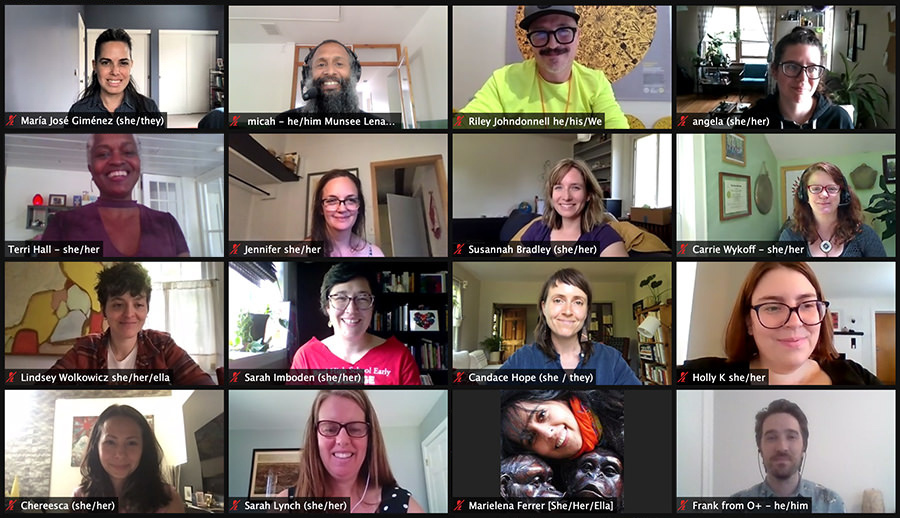If you have attended a GWI workshop online, then you know a few things about how we begin. Whomever is facilitating says hi and welcomes folks. They probably offer some kind of check-in question for participants to respond to via chat or perhaps vocally. We talk about Just Transition, briefly or at length depending on the workshop. We generally offer some grounding to start as well. But before we start, we ask participants to make sure Zoom is displaying their name as opposed to an organization or someone else’s and we always make a request…
“We invite you to add your pronouns after your name. You can see mine as an example.”
“Micah – he/him.”
I have noticed that in some spaces, this has become standard practice. I have also seen some people struggle with this as it might represent a change that they are not used to or they may not fully understand the reasoning behind. So, I thought I would explain why we make this request, knowing that we may not all share the same understanding. If you are reading this, it probably means you are open to trying. Any questions you may have are important. Whatever you may be feeling about the topic is also important. I truly hope that my perspective on this can be of some aid to you.
There is so much about our culture that has become the accepted default. We come to view what we default to as normal and see everything else is an aberration.
As an example, the concept of white culture is still new for some, assuming that the default just is. This is the insidious nature of systemic oppression: there is one way of being, one acceptable norm and everything else is deviant.
In order to change these systems, we must see them for what they are. This requires that we be mindful even with our language, and that we question the “norms” that govern our lives. A Just Transition requires this willingness to examine myself, how I show up, and the language that I choose to use.
Pronoun usage is one of these so-called norms. Our social structure defines what a man is and what a woman is, how they should look and act. When we go along with this norm, we unconsciously accept the default that our genders need to fit into this binary. Perhaps some recognize that this is outdated or even harmful and believe others should be allowed to identify themselves as they see fit, but stop short of seeing a need to question their own default.
Cisgendered. I identify as cisgendered because the so-called default must be named and recognized in order to unseat its oppressive hold on others. No one is an aberration and no one can claim normal, rather we are all present somewhere on a spectrum of identities. The freedom that some express by breaking out of a binary restriction is a freedom available to us all. I identify as cisgendered not only in solidarity, but also as a small step towards my own liberation from an oppressive socialization I’ve been immersed in and largely, mindlessly, unaware of since birth.
Stating my pronouns regardless of whether they align with the sex I was assigned at birth or have gone unchanged in my lifetime, and regardless as to how I appear to others is an act of disruption against an oppressive system, toward its eventual undoing.
By asking you to not make assumptions about my (or others’) identities and to not simply cast me (or others) makes space for welcoming a full spectrum of identities.
As a facilitator, I also do not want to make assumptions about the identities of the participants that I am holding space for. The assumptions that I make become a tool of upholding the oppressive systems that I wish to dismantle. By requesting participants state the pronouns they use, I am able to facilitate respectfully in accordance with how participants identify.
I have found myself speaking a lot about a core concept of becoming a shared leadership organization being “making the implicit explicit”. Earlier this year, I wrote an article on how crucial that concept is to the practice of shared leadership and how much it permeates my life. It is the same principle showing up here. We can’t afford to allow the “default” to go unnamed. If we want to undo domination and live liberated lives, we can’t afford to let oppression be unchecked. It lives in us and the language we use. It exists implicitly. When we draw it out and decide to act explicitly, we are choosing clear, conscious communication and aligning our actions with our values. This is why we request that you state your preferred pronouns in workshops at GWI.
It should be noted that this article is written from my own cisgendered perspective. There are many additional resources available. Please go deeper if any doubt still lingers for you. You can visit Pronouns: A How-To and also watch Why Gender Pronouns Matter.


